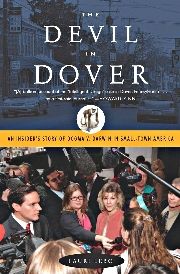
In San Francisco for a speaking tour, Lauri Lebo, who reported on the Kitzmiller v. Dover case for the York Daily Record and then wrote The Devil in Dover: An Insider's Story of Dogma v. Darwin in Small-Town America (The New Press, 2008), was interviewed by the San Francisco Chronicle's Nanette Asimov, with the result appearing both in the newspaper (October 31, 2008) and on its podcast. Discussing the genesis of the case, Lebo explained that at first, the creationists on the Dover Area School Board "had been talking about creationism. They said the Earth is 6,000 years old. They believe man walked with dinosaurs. They also knew they could not push God into science class. They needed something a little sneakier. This is what intelligent design was." "Intelligent design" itself she described as "revamped creationism, the idea that life is so complex that it demands a guiding hand."
A lawsuit eventuated, of course, in which NCSE aided the legal team for the plaintiffs and in which three members of NCSE's board of directors, Brian Alters, Barbara Forrest, and Kevin Padian, served as expert witnesses. In his verdict, as Lebo explains, the judge "said not only that the board members lied, he chided the 'breathtaking inanity' of what the board had done in trying to push their religious views into science class. The big question was: Would he also rule that intelligent design was not science? And that is what he did." Asked to assess the impact of the decision, Lebo said, "It only affects Dover. However, outside Dover, a lot of districts have been paying attention. Ohio took their intelligent-design-friendly curriculum guidelines out. This cost Dover taxpayers $1 million. So districts are paying heed. However, this battle is not over. We're seeing big challenges in Texas and Louisiana — and we expect other ones under the guise of academic freedom."
